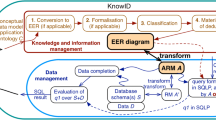Abstract
The purpose of a database management system is the reliable and efficient management of shared persistent data. Current knowledge-based systems are designed for representing and processing knowledge in a way that is cognitively adequate. Since knowledge should be kept persistent as well, it seems to be interesting to combine the techniques of database management systems and knowledge-based systems into something like a knowledge base management system. We shortly show some conceptual differences between these two types of systems and then discuss how database concepts should be evolved in order to meet the requirements of knowledge-based systems. Using LILOG-DB as an example, we demonstrate in detail the modeling capabilities a database system should provide in order to support typical knowledge structures.
Especially, we discuss the design of FLL, a first-order logic based query language supporting an order-sorted complex-object data-model under an Open-World Assumption.
The work reported here was carried out within the LILOG-project of IBM Germany
Preview
Unable to display preview. Download preview PDF.
Similar content being viewed by others
References
J. R. Abrial, ”Data Semantics”, in J. W. Klimbie, K. L. Koffeman (eds.): Data Base Management North Holland, 1974
R. Agrawal, N. Gehani: ODE (Object Database and Environment): The Language and the Data-Model SIGMOD 1989
H. Ait-Kaci, R. Nasr: LOGIN: A Logic Programming Language with Built-In Inheritance JLP 1986, 3, 185–215
F. Bancilhon, R. Ramakrishnan: An Amateur's Introduction to Recursive Query Processing Strategies SIGMOD, Washington, 1986, pp. 16–52
C. Beeri: ”Formal Methods for Object Oriented Databases”Proc. 1st Int. Conf. on Deductive and Object-Oriented Databases, 1989
C. Beeri et al.: Sets and Negation in a Logic Database Language (LDL1) PODS 6, 1987, 21–37
C. Beeri, R. Nasr, Sh. Tsur: Embedding ψ-terms in a Horn-Clause Logic Language Proc. 3rd Int. Conf. on Data and Knowledge Bases, Jerusalem, 1988
R. Brachman, J. Schmolze: An Overview of the KL-ONE Knowledge Representation System. Cognitive Science 1985, 9, 171–216
S. Ceri, G. Gottlob, L. Tanca: ”Logic Programming and Databases” Springer-Verlag, 1990
P. Chen: The Entity-Relationship Model: Toward a Unified View of Data. TODS 1976, Vol. 1, No. 1, 9–36
E.F. Codd: A Relational Model for Large Shared Data Banks CACM 13:6, pp. 377–387
O.J. Dahl et al.: SIMULA 67 Common Base Language Publication N.S-22, Norwegian Computing Center, Oslo, 1970
R. Elmasri, S. B. Navathe: Fundamentals of Database Systems Benjamin/Cummings, 1989
R. A. Frost: Introduction to Knowledge Base Systems Collins, 1986
G. Gardarin, P. Valduriez: Relational Databases and Knowledge Bases Addison-Wesley, 1989
M. Hammer, D. McLeod: Database Description with SDM: A Semantic Database Model. ACM TODS 1981, Vol. 6, No. 3, 351–386
H. Kamp: Discourse Representation Theory: What it is and where it ought to go. LNCS, Vol. 320, 84–111
R.T. Kasper, W.C. Rounds: A Logical Semantics for Feature Structures Proc. 24th Ann. Meeting of the Ass. for Comp. Linguistics, New York, 1986, 257–265
M. Ley: Ein Fact-Manager zur persistenten Speicherung variabel strukturierter komplexer Objekte IBM Germany, LILOG-Report 60, 1988, in German
M. Ley, B. Walter: Der LILOG-DB Fact-Manager: Ein Datenbankkern zur Speicherung variabel strukturierter komplexer Objekte to appear in: Informatik — Forschung und Entwicklung, 1990
T. Ludwig: FLL: A First-Order Language for Deductive Retrieval of Feature Terms IBM Germany, LILOG-Report 57, 1988
T. Ludwig: EFTA: An Algebra for Deductive Retrieval of Feature Terms IBM Germany, LILOG-Report 58, 1988
T. Ludwig: Algebraic Optimization of EFTA — Expressions. IBM Germany, LILOG-Report 59, 1988
T. Ludwig: The Design and Implementation of TLPROLOG IBM Germany, IWBS-Report 97, 1989
T. Ludwig: A Brief Overview of LILOG-DB. Proc. Data Engineering Conf. 1990
T. Ludwig: Compilation of Complex Datalog with Stratified Negation Proc. 9th British National Conference on Databases, York, 1990
T. Ludwig, B.Walter: EFTA: An Algebra for Deductive Databases. To appear in: Journal of Data and Knowledge Engineering
T. Ludwig, B.Walter, M.Ley, A.Maier, E.Gehlen: LILOG-DB: Database-Support for Knowledge-Based Systems Proc. BTW, March 1989, Springer
S. Naqvi, S. Tsur: A Logical Language for Data and Knowledge Bases Computer Science Press, 1989
B. Nixon, L. Chung, et al.: Implementation of a Compiler for a Semantic Data Model: Experience with Taxis. SIGMOD Conf. 1987, San Francisco, 118–131
J. Peckham, F. Maryanski: Semantic Data Models. ACM Computing Surveys, Vol.20, No.3, Sept. 1988
T. Przymusinski: On the Declarative Semantics of Deductive Databases and Logic Programs In: Foundations of Deductive Databases and Logic Programming, Morgan Kaufmann, 1988, pp. 193–216
J.E. Richardson et al.: The Design of the E Programming Language Comp. Science Technical Report 824, Univ. Wisconsin, Madison, 1989
J.C. Shepherdson: Negation in Logic Programming In: Foundations of Deductive Databases and Logic Programming, Ed.: J. Minker, Morgan Kaufmann, 1988, pp. 19–88
S. Shieber: An Introduction to Unification-Based Approaches to Grammar CLSI Lecture Notes 4, Stanford University, 1986
O. Shmueli, Sh. Naqvi: Set Grouping and Layering in Horn-Clause Programs 4th International Conference on Logic Programming, Melbourne, 1987, 152–177
J. F. Sowa: Conceptual Structures, Information Processing in Mind and Machine Addison-Wesley, 1984
J. Ullman: Principles of Database Systems. Computer Science Press, 1987
J. D. Ullman: Principles of Database and Knowledge-Base Systems, Vol. I Computer Science Press, 1988
J. D. Ullman: Principles of Database and Knowledge-Base Systems, Vol. II Computer Science Press, 1989
C. Zaniolo and D. Sacca: Rule Rewriting Methods for Efficient Implementations of Horn Logic MCC Technical Report DB-084-87, 1987
Author information
Authors and Affiliations
Editor information
Rights and permissions
Copyright information
© 1991 Springer-Verlag Berlin Heidelberg
About this paper
Cite this paper
Ludwig, T., Walter, B. (1991). Database concepts for the support of knowledge-based systems. In: Karagiannis, D. (eds) Information Systems and Artificial Intelligence: Integration Aspects. IS/KI 1990. Lecture Notes in Computer Science, vol 474. Springer, Berlin, Heidelberg. https://doi.org/10.1007/3-540-53557-8_23
Download citation
DOI: https://doi.org/10.1007/3-540-53557-8_23
Published:
Publisher Name: Springer, Berlin, Heidelberg
Print ISBN: 978-3-540-53557-7
Online ISBN: 978-3-540-46809-7
eBook Packages: Springer Book Archive




